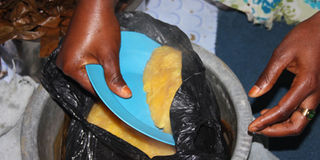Why food prepared in polyethylene is a health hazard

While many people might find it convenient to prepare food covered with polyethylene bags, public health experts say it could have some negative health consequences. Photo by Abubaker Lubowa.
With the growing change in trends, and people diverting from traditional ways of preparing food covered using banana leaves, to adopting other forms such as the use of polyethylene bags, many people could be risking their health and lives.
Twaha Rwegyema, from Diet Clinic says that when the polyethylene is heated, all the bi-products or chemicals of the bag go into the food. “These chemicals do not have an immediate or onset effect, but a person who eats such food may develop a running stomach,” says Rwegyema.
And when there is an increased exposure and intake of food prepared using polyethylene bag as cover, the resultant effect is that the body will not be able to digest the polyethylene bag bi-products, and the person will be exposed to enormous consequences such as the development of many cancers in the body.
Toxic effect
“When the body receives an external or foreign element, the body mechanism retaliates by sending it’s cells to fight the foreign, in-taken harmful components. And when the body cells are over powered, abdominal, kidney and other cancers are likely to occur,” explains Twaha.
If it is children, they may experience intensive diarrohea because their body systems are weaker compared to those of the adults.
Polyethylene bag has the same effect on human beings, just as it has on the environment.
Rwegyema further says that since some chemicals used to manufacture polyethylene bags like chlorine have a bad scent when exposed to heat, breathing in such chemicals have negative consequences on human health, such as allergies.
Alternative option
He advises that the use of banana leaves is a better alternative.
Dr Edward Kiyonga, a general medical practitioner, notes that polyvinyl chloride, one of the chemicals used in manufacturing polyethylene bags, has a high potential of transferring in foods if it is used in its preparation.
This is because free radicals leaching into food under heat bring about toxicity.
This, Dr Kiyonga says leads to the accumulation of harmful polyethylene bag elements such as lead, which is dangerous to the body.
Apart from the threat of cancer, Dr Kiyonga explains that food prepared in polyethylene bags diminishes nutrients from food, thereby rendering it of no nutritional value to the body.
Growth retardation
Fredrick Lule of the Department of Agricultural and Bio Systems Engineering at Makerere University says that the number of metals found in food prepared in polyethylene bags can potentially retard growth and damage organs such as nervous system.
In extreme cases, it can lead to death.
“But excessive exposure to some metals like mercury and lead may also lead to development of autoimmunity in which a person’s immune system attacks it’s own body cells, which leads to occurrence of joint diseases like rheumatoid arthritis and kidney diseases,” Lule says.
One study that examined posho, as one of the common foods prepared in polyethylene bags, Lule says that the migration of metals such as mercury and lead, to the food was found to be high.
“For any food prepared or stored in plastics, there is migration of metals, whether it is under low or high temperatures,” says Lule.
He says that metals like lead and mercury are particularly toxic to the sensitive, rapidly developing systems of the foetus, infants and young children if expectant mothers regularly eat food cooked in polyethylene bags.
“Some metals such as mercury easily cross into the placenta, and damage the foetal brain,” adds Lule. When children are exposed to such metals early in life, Lule says it can potentially affect their learning capabilities.




